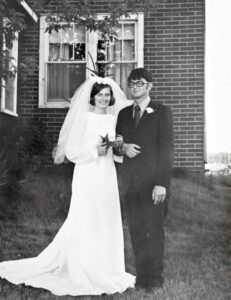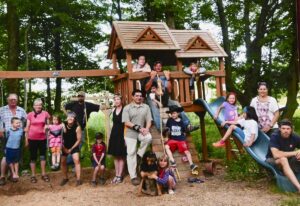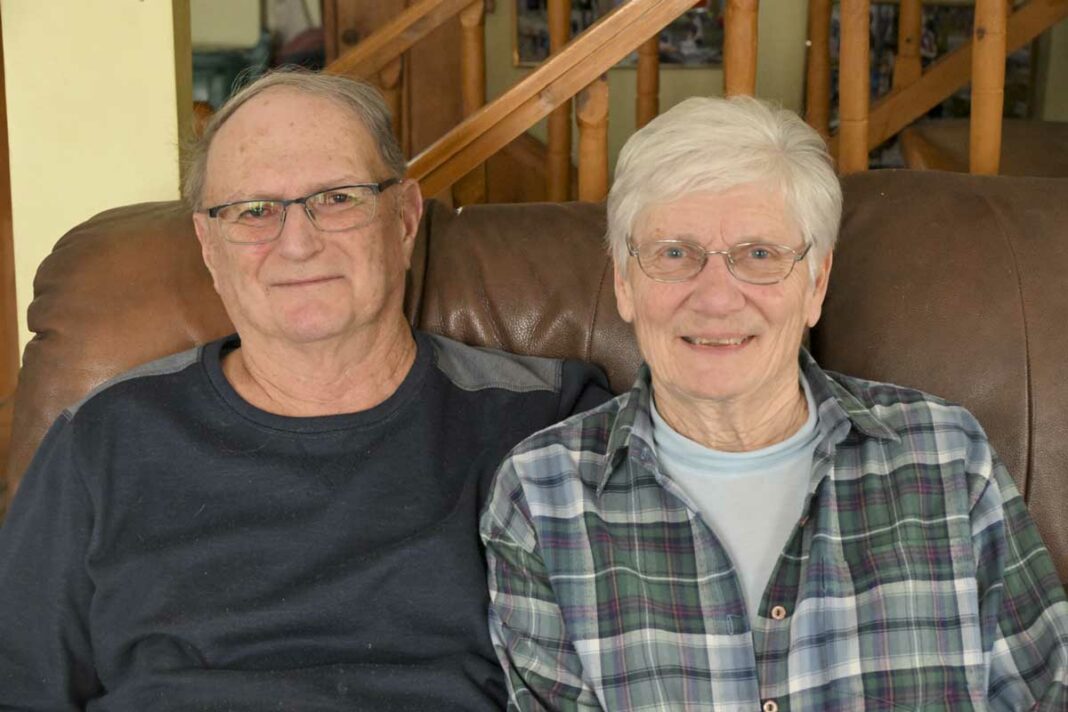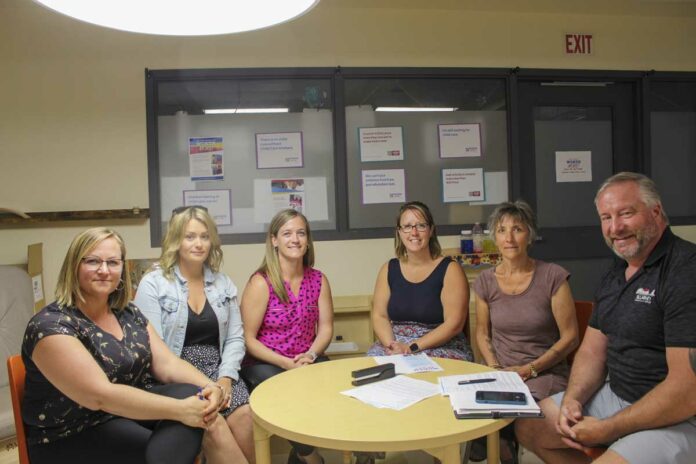This Islander family joins many others who have called Manitoulin home for several generations. They remain a close-knit family with all four of their children, their spouses and grandchildren nearby. “Our home has always been ‘Grand Central Station,’ a place for family gatherings from the very beginning. “Our children would bring their friends over because they all felt welcome here during the elementary, high school and college years. In grade school, our five or sometimes six grandchildren would get off the school bus here and stay until their parents picked them up. They played well together and enjoyed tasty snacks we would prepare for them. We loved having them visit.” Burke has also spent many years building and fixing houses, sheds and anything else the community or the family needed. Alice has taught both high school and elementary school. “I enjoyed working with the children during the day and then coming home to our family and their friends.”
Burke begins, “In 1848, my maternal great-great-grandparents, Dugald and Rachael (McGlauclin) McArthur homesteaded in Annon, just outside of Owen Sound. One son John married Marian Sutherland and in 1877 they came to Manitoulin Island with their family. They bought the original farm from the Crown and homesteaded near here, on lots three and four, concession two, Bidwell Township. John was on council for Assiginack in the 1890s. “My maternal grandparents are George and Sadie (McArthur) Chatwell. The Chatwells, originally from Devonshire, England settled near Erin. They left Erin to get away from the rocky soil and relocated to Manitoulin where they discovered to their dismay, just as many rocks.”
“Paternal grandparents, John and Elizabeth Pennie’s ancestors, were British. John and his sister may have come to Canada as ‘orphans’. They showed up in the 1891 census as being adopted, growing up with the Riddell family in Manitowaning. John helped on the farm at first, then worked for the timber company at Michael’s Bay.” Some of the grave markers there bear the Pennie name. There is also a street, Pennie Avenue, near Michael’s Bay. After the lumbering stopped at Michael’s Bay, John moved to Tehkummah. He and Elizabeth had 15 children and John worked in the timber industry at Fitzwilliam Island and Collins Inlet, near Killarney. Remnants of the old buildings at Collins Inlet are still visible.”
“My father, Clarence was one of the older sons in the family. At 12, he worked as a clerk at various locations for his father’s lumber business. Each location had established buildings suitable for administration, accommodation, and meal service. After he left the lumber business, Clarence found work at the farm of Margaret Chatwell’s mother.” In due course, he married Margaret and Burke was their third son, born on February 28, 1949, at the old Mindemoya Red Cross Hospital. (According to Hugh Moggy, he was born on the stormiest day of the year.) Burke’s mother had temporarily moved in with her sister in Providence Bay prior to the birth. Burke had two older brothers, George, and Wayne.
“I remember Grandmother Sadie Chatwell’s stories while sitting on her knees. She talked about her parents’ homesteading adventures. She had been born on Manitoulin. I have always enjoyed learning local history. Grandmother died when I was five years old.” Walking to the Bidwell School at age six was an adventure at first. Burke had to be wary of the bull that his brothers claimed could emerge from the trees and chase them. “Thankfully, the bull and I never met and six months later, buses took us to a more central location in Manitowaning.”
Burke raised his own calves as part of 4-H. He won several awards. Summer jobs were at a private camp his parents operated, and at the Lone Star Camp on Lake Manitou, catering to American fishermen and owned by Americans. “After I turned 12, I had my own herd of 18-20 cattle.” Grades 12 and 13 were taken in Sault Ste. Marie. “I wanted to get a respite from the high school politics in Little Current, so I relocated to the Sault. After graduating, I attended Laurentian University, splitting my major to take both Political Science and History, with a minor in English.”
Burke met Alice again at a Tehkummah dance, remembering her from his teen years. He and a friend from Laurentian spotted Alice and a friend sitting at a table. “Let’s see if we can get them to dance.” Burke danced with both ladies, but he was smitten by Alice who was taking courses at Guelph University. After completing his bachelor’s degree, Burke could have gone into teaching, but he changed course and became a carpenter, so he could build his own and other houses.
Alice begins: “My paternal grandparents were Harriet and William Dewar. William was also sent, at age 12, from Scotland to North America for a better life. He worked for a family in Collingwood. Later, he cut railway ties at a Michael’s Bay lumber camp. He liked to smoke a pipe in his favourite armchair as he listened to an old radio. He also liked to impress the ladies and the guests with his step-dancing at the hotel in Providence Bay. He met Harriet there and married her in 1907.” In their later years, they moved to town, but they still had a big garden each summer.”
“Maternal grandparents were James and Alice (Cooper) Hopkin. They had nine children. James was born in Southern Ontario, and he came to Manitoulin to farm. He had taken some veterinary courses, supplemented with practical experience in the field. He offered his services to the local farmers in Tehkummah. Grandmother Alice was a great cook, and she took in boarders.”
Alice was born on March 12, 1949 to John (Jack) and Maud (Hopkin) Dewar. Alice, the youngest in her family, grew up in Providence Bay. An early memory is a trip to Toronto with her mother and her sister. “I was three, when I spotted a horse-drawn milk wagon. ‘Look mum, they get their milk from a horse,’ I proclaimed. I can still see their reaction and hear the laughter,” Alice shares. “When I was in school, cousin Lyle (Dewar) and I would visit Grandmother Dewar after we got off the bus. “‘Howdy Doody’ came on at 4:30 pm and we would get there just in time to see it. Neither of us had a television. Grandmother would make us cookies with lemon buds.”
“We often skated at the arena in town because it was close to our grandparents’ home. Like my mother and my older sister, I was also in 4-H. That was where I first met Burke who was raising his own calf. I was in the homemaking and calf clubs. I liked sheep too. When the new lambs came along, there were always a few that had been abandoned by their mothers, often because there were too many offspring. I would feed these infants until they were old enough to go to pasture. Once I found an abandoned baby seagull in Timber Bay where they nested. I fed him lots of worms. Ducklings, orphaned by the hay rake, would also be cared for. My mother had set an example by raising a deer when she was a young girl.”
Alice was taking Household Sciences, at Guelph University in 1970, when she saw Burke again at the Tehkummah dance. After graduating from Guelph, Alice was qualified to teach at the high school level and taught high school in New Liskeard. “We were married that year, on July 2, 1971, at the Providence Bay United Church.” Burke injects, “I worked in the hayfield all day, then quickly got ready and headed for the church.” “Our catered reception for 200 guests was at the Mindemoya Hall, decorated the night before. There were two settings for the midnight meal,” Alice adds. “I had made my dress and those of the two flower girls. Luckily, I only had to get my hair done on the day of the wedding.”

“Afterwards we packed the car and headed for the Lakehead.” Alice was taking teaching courses there. Burke took two electives at Lakehead University, economics and social work. In September, the couple headed back to Sudbury. Alice taught grades nine and ten in Garson and later, Grades 9 to 12 at Lively High School. In time, she opted for Grades 7 and 8 at Georges Vanier School. “I liked this age group the most. I taught family studies and the communication seemed to be optimal with this group.” In later years, Alice taught at the Assiginack Public School.
The couple has four children: Heather, John, Tina and Robert. When the children were younger, Burke and his brother George did some construction and renovation work on the farm. Burke and Alice had both decided that the first person home would start supper. That worked well until Alice had to work late at the Manitowaning school and Burke was doing most of the cooking. Swiss steak and spaghetti were popular when he was the chef.
When the children turned 12 in the late 1980s, they all joined the 4-H community. Burke and Alice volunteered to lead the groups. The 4-H exchange trip to Alberta was a highlight for all involved. “Dorothy Glasby and Alice took 15 kids between the ages of 14 and 18 on the trip. Some students had not been on a plane before. I recall one of the boys expressing a bit of regret at the airport. ‘I don’t want to do this.’ It was his first time on a plane and the first time he would be billeted. Nevertheless, it was an excellent learning experience for all the youngsters. They attended a rodeo and visited Ukrainian and Hutterite communities in the town of Three Hills. I think all were happy they had taken this journey.”
“The Alberta 4-H group came to Manitoulin for their trip later that summer. The visiting group was taken to the Big Nickel, and The Lone Star Camp and a barn dance at a neighbour’s farm. The Cup and Saucer was scaled, and a quick trip made on the Chi-Cheemaun. They all became good friends and continued to connect with letters for several years afterwards. Unfortunately, our grandchildren missed the exchange opportunity due to COVID.”
Alice is currently the chairperson of the Manitowaning Agricultural Society. “It’s our 147th year and we are already planning for this year as well as the 150th year of the Manitowaning Fair.” Burke was on the provincial 4-H council for three years in the late 1990s. He attended three-day meetings four times a year. Community initiatives were also part of 4-H. One task was grooming the trails in the McLean’s and Manitowaning Parks. Four-H members also volunteer at special events including shows like ‘Reach for the Top’ or ‘Go for the Gold.’ “Our family team, Robert, 11, John, 14, Tina, 15, and Heather, 17, represented Northern Ontario at the Royal Winter Fair. Northern Ontario includes areas between Parry Sound and the Manitoba border. They were the youngest team, and they were competing against university students. They did very well, coming second in the championship round which included general, outdoor recreational, as well as animal husbandry questions.”
“Today, daughter Heather, who has a concurrent BA, and BEd from Lakehead University, is the principal at the Little Current Public School and her husband, Mark Gibeault, a teacher, is doing administrative work at Kenjegewin Teg. They have two children at Loellen Park School, Brooke, in Grade 11 and Dane in Grade 9. Our son John, who lives next door, has an Honours Degree in Agriculture from Guelph and is a technician at the Blue Creek Fish Hatchery. His wife Lara taught school. They have two offspring, Jack in Grade 12 and Grace in Grade 10 at Manitoulin Secondary School.”
“Tina, who has a degree in physical education and science (BPHE/BSc) from Queens, is married to John Balfe and they both teach at Manitoulin Secondary School. They have three children, two at MSS: Annie in Grade 11 and Mya in Grade 9. Jonah is in Grade 8 at Central Manitoulin. Robert has an Honours Degree in Science and Agriculture, also from Guelph. He is the Manager of the Northland Agri-Mart in Gore Bay. His wife Lisa teaches at Central Manitoulin Public School. They have two sons, Brodie in Grade 11 and Rylan in Grade 9, also at MSS. We have four adult children, four in-laws and nine grandchildren,” Alice adds, smiling.
It seems many of Manitoulin’s children are being taught by the Pennie family and their partners. Alice has babysat all nine of the grandchildren; before school and on professional development ‘PD’ days. “I just had to ensure that they were well-fed. Typical meals were vegetables, with apple crisp or apple sauce, lasagna or peanut butter and jam sandwiches. Our children were born close together so their children are close in age as well and that encouraged optimal relationships. Even in the university years, Burke’s brother next door would see a full house and numerous cars in our driveway.”
“We were used to lots of visits. In the year 2000 we had an entourage of family and friends arrive three days before Christmas and we had people coming and going until January 2, 2001. At any one time, we often had six visitors out of about 16 family members and friends. We always had a pot of stew or chili on the go to feed them.”

Today, Alice still shares much on Facebook with her siblings and 15 cousins. The couple attends many hockey games in Mindemoya, Little Current, Manitowaning and Wiikwemikoong. They also attend basketball and volleyball games for the travelling teams. “One weekend,” Burke adds, “I watched their basketball and volleyball games on YouTube over two days and attended hockey games here at night.”
Were you named after anyone? “Both of us were named after our grandparents.”
Most important event in your life? “Our marriage, our children, and grandchildren.”
Favourite pets? “Sam the cat. We also had ‘Fat Sally’ the Hereford-Charolais cross cow. The kids used to put a plank against her and walk up to sit on her back,” Alice adds, “alternatively, they built up a stone pile and climbed up. She didn’t walk far or fast, so it was always fun.”
Responsibilities as a child? Alice milked cows and drove the tractor at haying time. Burke hayed with his two cousins next door. “They were like brothers to me. Sometimes I would race the tractor and rile up my older brother,” he adds, smiling.
Favourite time of the year? “Spring. The calves and lambs arrive,” says Alice. For Burke it’s the fall when it’s not hot, less busy and it’s hunting time.”
Favourite collections? “Interesting rocks and fossils in our gravel pit on the farm; also, books, old classics. Now the ‘LIBBY’ program of Ontario Libraries allows us to load books on our devices from the local library and return them when read.
Memorable trips? “Participating in ‘Go for the Gold’ for the 4-H program and riding the Polar Bear Express, as well as travelling to Elora. A big 28-hour canoe race in the Yukon ending in Dawson City was exciting.” Burke and Alice were babysitting.
Interesting television shows? “Night Court and the news.”
Favourite sport? “Curling and figure skating when I was younger,” for Alice.
First job? In the summers, Alice started with the Merritt Motel and later, the research station at South Baymouth. Burke got three dollars per hour working part-time at a tourist camp. For his last year at university, he made three dollars and twenty-seven and a half cents an hour at INCO on the graveyard shift. “At that time, students stayed longer in school because jobs were scarce.”
Strengths? Working with children, teaching, sewing, and babysitting (Alice) and for Burke it’s having significant general knowledge and enjoying a great relationship with family. “On our farm now, we have two hens and 16 cows that usually calve in April. I help our son at lambing time which is the first of May. He has 100 lambs. I can still cut up logs with a bandsaw, despite having arthritis in some of my limbs.” Anything that frightens you? “Fire and being predeceased by my children or grandchildren.”
Anything you would change if you could go back in time? No, for both.
Anybody that inspired you? “A chaplain at Queens. He was good with children. He married my parents before WWII, married us and baptized our four children. Also, the guidance counsellor in the Sault. He helped inspire me to get my degree and then inspired me to show it to him.”
Recipe for happiness? “Enjoy your family and encourage them to take part in many activities, not just those for fun. We used to play math and geography games in the barn while working. No gender-specific roles. All our kids can fix things and cook.”
“We have always come back to Manitoulin, no matter how far we travelled. We moved back here in 1979 after a dozen years of working in Sudbury at INCO and at my own siding business,” Burke adds. Alice taught school. When Burke was laid off, they sold the city house and moved back to the Island. “I had half the blocks laid for our house when INCO called, but I declined the offer. We wanted to stay on the Island. At the time, our friends thought our three children might have more opportunities in Sudbury, but we didn’t agree. Now all four offspring live on Manitoulin Island and they are happy here. It has been a great place to raise kids. Schools are small and all children participate. Teachers are knowledgeable and familiar with local families and the Island. Manitoulin is our birthplace and that of our parents and some grandparents. You can farm, hunt, and live a full life. Our hearts have been, and always will be, here.”





